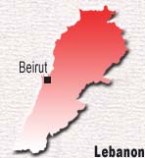Lebanese sceptical of terrorist confessions on Syrian TV
 Beirut - A Syrian state television broadcast showing people tied to Lebanese organizations confessing to a September Damascus bomb attack is an attempt to smear Lebanese institutions, Lebanese politicians said Friday.
Beirut - A Syrian state television broadcast showing people tied to Lebanese organizations confessing to a September Damascus bomb attack is an attempt to smear Lebanese institutions, Lebanese politicians said Friday.
The Thursday-night broadcast showed ten men and a woman alleged to be members of the group Fatah al-Islam confessing to carrying out the September 27 car bombing that killed 17 people and wounded 14 others near a Shiite shrine in southern Damascus.
Some of the confessions said the group had received funding from the Lebanese Future Movement, a Beirut-based political movement that seeks to remove Syrian influence from Lebanon, led by Saad al-Hariri.
Critics of the broadcast say the Syrian government forced the confessions and will now use them as a pretext to smear Lebanese independence groups or even launch its own terror campaign within Lebanon.
Boutros Harb, a member of parliament, told the Voice of Lebanon radio station Friday that the Syrian broadcast was designed to tarnish the image of the pro-independence, anti-Syrian March 14 Alliance, of which the Future Movement is a member.
The group faces parliamentary elections in 2009, when it will compete with the pro-Syrian, Hezbollah-led March 8 coalition.
Additionally, March 14 members said the broadcast was designed to divert attention from the upcoming release of a report on the 2005 assassination of ex-premier Rafik Hariri. Many analysts believe the Syrian government played some role in the murder.
"This (Syrian) regime is trying to imply that responsibility for the killings should be shared by all," said a statement from the March 14 coalition.
The statement, released after a meeting by the March 14 Secretariat General, also accused the Syrian regime of setting the stage for launching a "terror campaign" against the Lebanese people "under the pretext of self-defence."
Sceptics noted that two of the alleged terrorists seemed haggard and spoke with difficulty during their confessions. Viewers also noted that none of the people confessing explained their motivation for allegedly planting the bomb.
Previously jailed dissidents who watched the show recognized the room where filming took place as a facility where several of them had been detained by the intelligence service.
Individuals shown in the broadcast included Wafa al-Abssi, the daughter of Fatah al-Islam leader Shaker al-Abssi. The father has been a fugitive since he escaped security forces in Lebanon after the militant group's 15-week battle with the Lebanese army in the Palestinian refugee camp of Nahr al-Bared in 2007.
According to Lebanese security sources Wafa al-Abssi said Fatah al-Islam received money from Salafist groups backed by Saudi Arabia to carry out the attack.
Abssi named Abu Ritaj and Abu Youssef, both Saudi nationals, as their Saudi contacts. She also accused Lebanon's Future Movement and some of its banks of involvement in financing the group.
Sources with Future Movement denied any link with Al Abssi and "her terrorist ring."
Another person on the broadcast, Syrian Abdul Baqi al-Hussein, said the aim of the September attack was to "harm the regime in Syria." He was introduced as the militant group's head of security, spokesperson and Abssi's number two
Hussein said that the man directly responsible for carrying out the attack was a Saudi called Abu Aisha, who was killed in the bombing.
The group also planned to attack security offices in Syria and to target an Italian and a British diplomat, he added. (dpa)